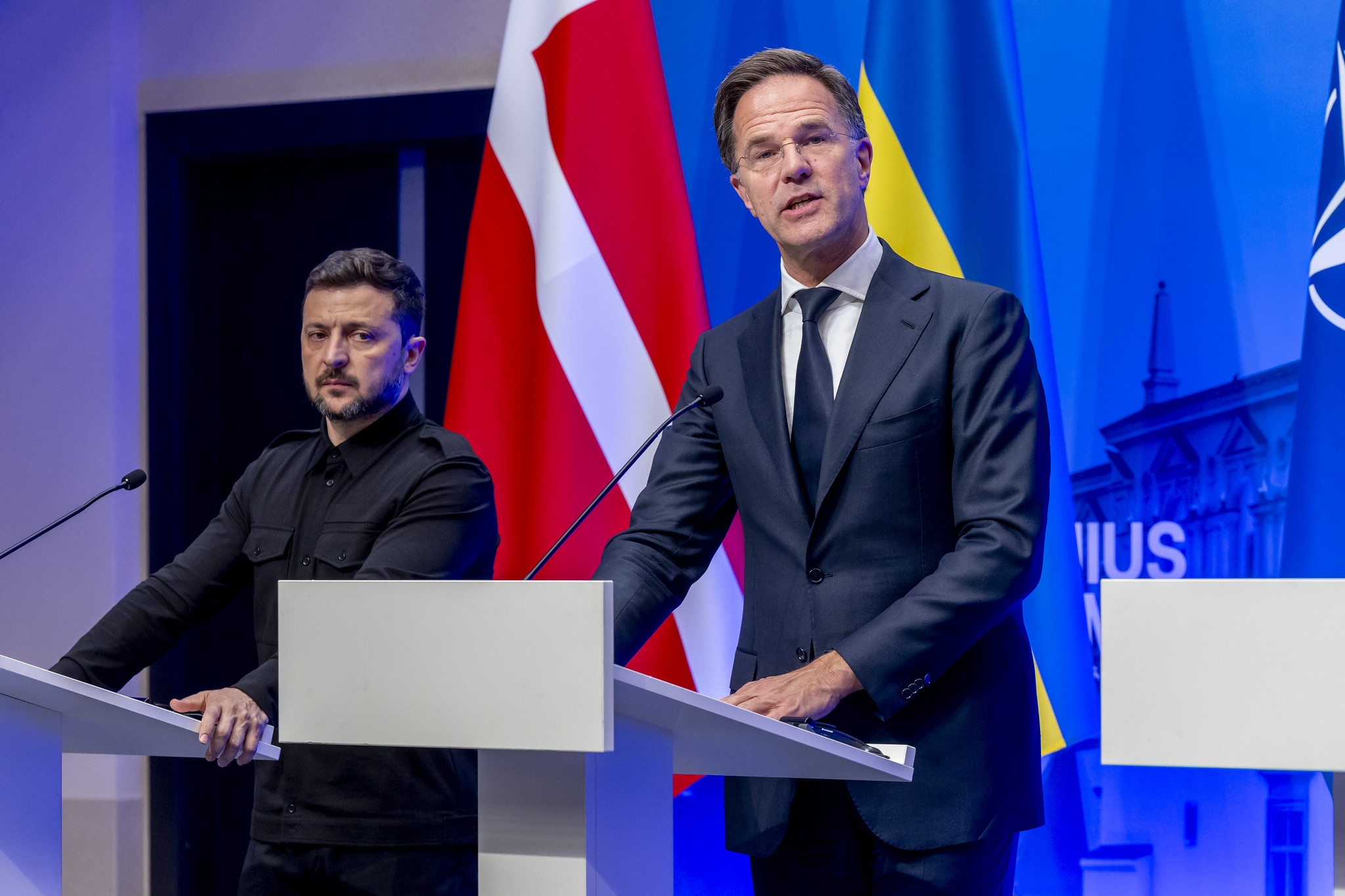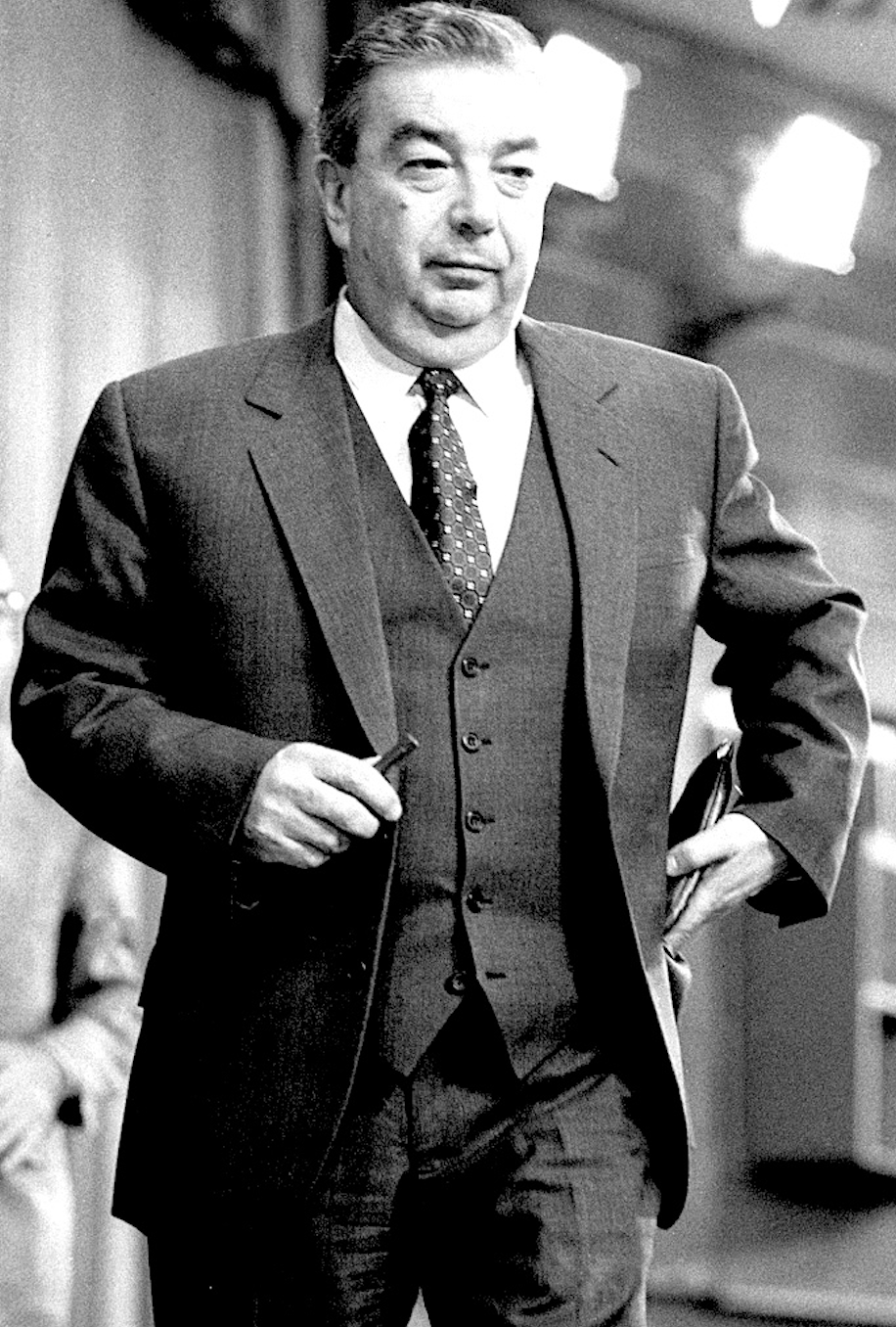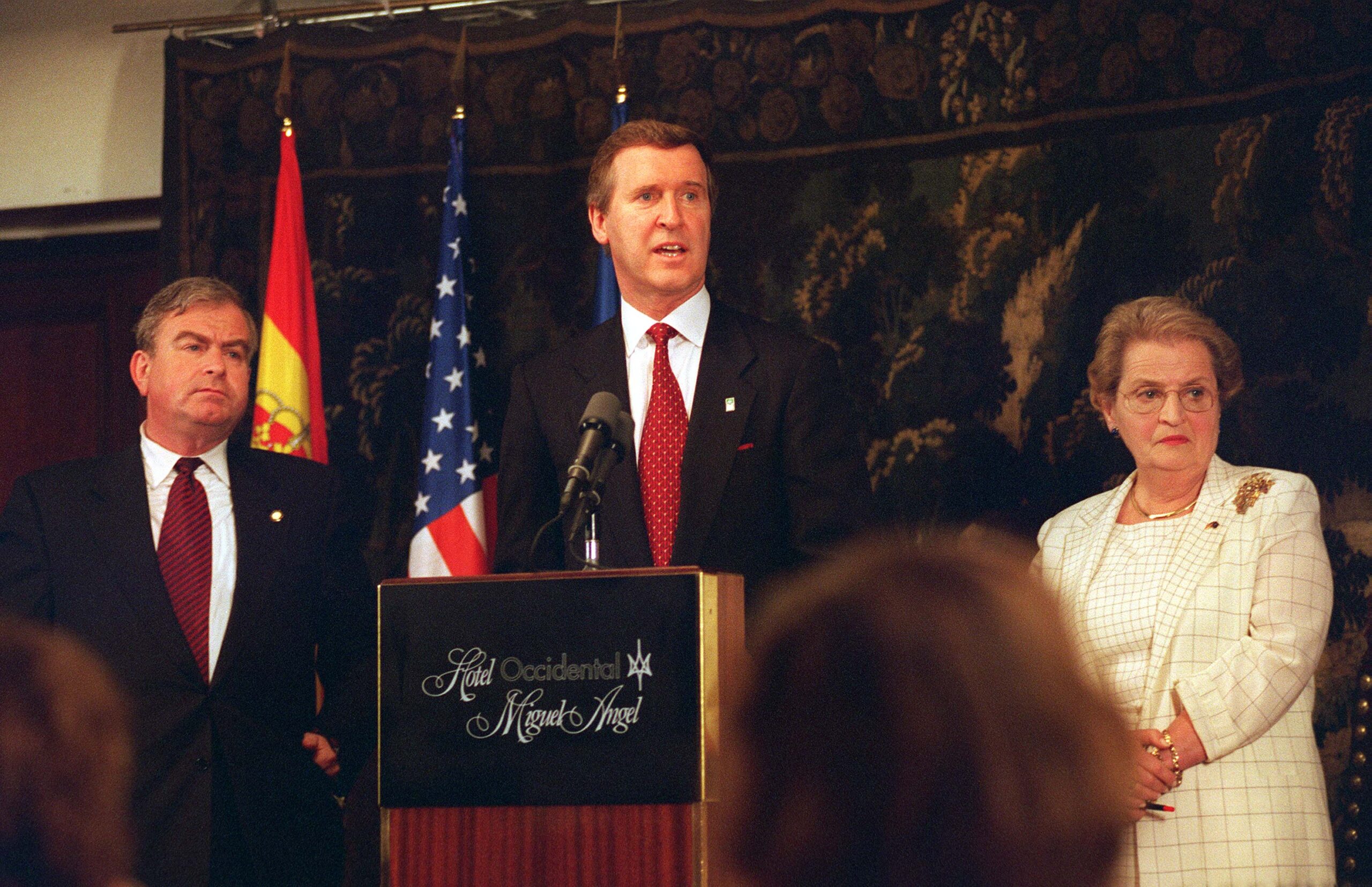Two British prime ministers recognised Moscow’s fears over NATO expanding in eastern Europe — a major cause of the Ukraine war — files show, Mark Curtis reports.

Ukraine’s President Volodymyr Zelensky and NATO Secretary General Mark Rutte on June 2 in Vilnius, Lithuania. (NATO/Flickr/CC BY-NC-ND 2.0)
By Mark Curtis
Declassified UK
 Declassified British files shed further light on the controversial question as to what assurances were made to Russia by U.K. officials about the expansion of NATO into eastern Europe.
Declassified British files shed further light on the controversial question as to what assurances were made to Russia by U.K. officials about the expansion of NATO into eastern Europe.
The documents show then Prime Minister John Major telling Russian Foreign Minister Yevgeny Primakov in February 1997 that “if he were Russian he too would be concerned by the possibility that NATO might move up to Russia’s borders.”
But Major added that “NATO has no intention of doing this” and was “not seeking to box in Russia.”
Briefing notes drawn up by No. 10 Downing Street [the prime minister’s office] for Major’s phone call with Primakov stated: “We are not seeking to encircle Russia with NATO members.”

Primakov in 1991. (RIA Novosti archive /Prihodko / Wikimedia Commons /CC-BY-SA 3.0, CC BY-SA 3.0)
The following month, Major wrote to Russian President Boris Yeltsin saying: “I am well aware of Russian concern that NATO enlargement may mean that NATO forces will effectively move nearer your own borders. I well understand the fears that may be aroused in Russia.”
However, he added:
“But let me assure you that such fears are quite without foundation.”
The reason was that
“NATO has no intention of stationing large conventional forces or nuclear weapons on the territory of new members.”
Major also reassured Yeltsin that NATO would only deploy “a modest amount of NATO infrastructure… such as storage facilities and command and control arrangements.”
The declassified files released to the National Archives covering 1996-97 are full of references by U.K. officials to Russian “concern,” “negative attitudes,” “fears,” “hostility” and “resentment” about NATO enlargement.
At the time, NATO’s expansion was being considered for only a small number of central European countries, not former states in the old Soviet Union, such as Ukraine — which was an even more sensitive issue to Moscow.
An August 1996 paper drawn up by Downing Street clearly noted Russia’s policy of “not allowing Ukraine or the Baltic States to join NATO.”
‘Enlarge NATO anyway’

Major in February 1993, during a visit to the Clinton White House. (White House Photograph Office/Wikimedia Commons /Public Domain)
U.K. officials believed the Russians reluctantly “tacitly accept that enlargement will go ahead” — subject to their opposition to nuclear and conventional force deployments — “but cannot say so publicly.”
In December 1996, Russian Prime Minister Viktor Chernomyrdin told Major in private: “Russia could not stop NATO enlarging, but this would create a fragile situation which could explode.”
Major assured him: “We did not wish to do anything to unsettle Russia.”
[See: Tangled Tale of NATO Expansion at Heart of Ukraine Crisis]
The files show that Britain was intent on expanding NATO to include “some” central/eastern European countries.
A policy paper drawn up in September 1996 said U.K. objectives were “to enlarge NATO to the East” and “secure Russian acquiescence in enlargement … But if Russian acquiescence is not possible, for NATO to enlarge anyway.”
The paper was drawn up by Foreign Office official Matthew Rycroft, who in 2003 would be former Prime Minister Tony Blair’s private secretary during the war in Iraq.
‘Full Account of Russia’s Place’

Yeltsin waving at reporters in Moscow in August 1991. (Kremlin.ru /Wikimedia Commons /CC BY 4.0)
In the month Blair succeeded Major as prime minister, May 1997, Britain’s ambassador to Russia, Andrew Wood, cabled London saying: “NATO enlargement [is] a painful issue with domestic implications.”
He added: “The Russians are virtually at one in regarding the coming enlargement of NATO as a humiliating defeat, and in supposing that the West either consciously or unconsciously intends it to be seen as such.”
Please Donate to the
Spring Fund Drive!
However, Yeltsin also conveyed, in a phone call with Blair the same month, that he understood that “there was no turning back” on enlargement. But he again insisted that nuclear weapons should not be sited in new NATO members and that there should be “no permanent deployment of conventional forces.”
[See: Boris Yeltsin Privately Supported NATO Expansion Despite Public Stance]
A British prime minister again offered assurances to Moscow. A briefing for Blair’s meeting with Yeltsin in May 1997 stated on the subject of NATO enlargement: “We will not allow Russia’s legitimate security interests to be damaged in this process.”
It added that “an enlarged NATO will mean more security in Central Europe. This is in Russian as well as NATO interests.”
Blair told Yeltsin “he was aware of the view Russia took on NATO enlargement” and that “arrangements for the future had to take full account of Russia’s place and weight in Europe.”
Later that year, in October, Yeltsin told Blair again in a phone call that “he continued to oppose enlargement of NATO, which was a mistake. Europe should not be divided.”
At the time discussions were taking place about a comprehensive security system for Europe, replacing the old East-West divide and giving Russia a place in that system. It was clear, however, that NATO, led by the U.S., privileged expanding the organisation over bringing in Russia into a new European security architecture.
At NATO’s summit in Madrid in July 1997, the Czech Republic, Hungary and Poland were invited to begin accession talks, and they joined NATO in 1999. A further wave of accession occurred in 2004 when Bulgaria, Estonia, Latvia, Lithuania, Romania, Slovakia and Slovenia all joined NATO.

U.S. Secretary of Defense William Cohen giving a press statement on July 8, 1997, in Madrid, about NATO’s decision to invite Poland, Hungary and the Czech Republic to begin negotiations to join NATO. National Security Advisor Samuel Burger on left, Secretary of State Madeleine Albright on right. (DoD/ R. D. Ward/Wikimedia Commons / Public Domain)
By 2017, NATO had established a “forward presence” policy in eastern Europe, deploying battalion-size battlegroups in Estonia, Latvia, Lithuania and Poland. NATO claims this was needed in response to Russia’s “aggressive actions against its neighbours,” notably its [supposed] 2014 invasion of Crimea.
Opposing Ukraine
British files from 2001 show that Defence Minister Igor Sergeyev warned NATO that any further enlargement would be “a major political error” requiring Moscow to take “appropriate steps.”
By 2002, when Britain was supporting a new wave of central/eastern European states becoming members of NATO, Blair’s government was explicitly opposed to Ukraine joining the organisation, the files show.
“We do not support Ukraine’s request to join MAP,” the Foreign Office noted in 2002, referring to NATO’s Membership Action Plan, which provided advice to countries aspiring to join NATO.
Though Kyiv was pushing strongly for an enhanced relationship with NATO, Ukraine’s bid was “premature” in the British view since the country was “far from meeting criteria expected of aspirants.”
The U.K.’s chief diplomat at NATO, Emyr Jones Parry, noted that Ukraine was “on notice that deepening relations with NATO will require more democratic and other reforms.”
But also critical for British officials was the impact on relations with Russia. U.K. strategy was “to steer Ukraine away from any suggestion of membership except in the very long term” given the “serious impact on NATO relations with Russia.”
“Ukraine membership of MAP would greatly complicate our handling of the new Nato-Russia relationship and would raise serious Russian concerns about Nato’s strategy,” reads a 2002 briefing note for the prime minister.
Barrier to Russia

U.K. Prime Minister Tony Blair and Russian President Vladimir Putin, 2000. (Kremlin.ru / Wikimedia Commons / CC BY 4.0)
At the time, the Labour government was seeking a “transformed relationship between Russia and the Alliance,” a process which was described as “truly historic.” Indeed Blair was courting Vladimir Putin after MI6 had helped him into power in 2000.
British officials were impressed with Moscow’s declared support for the U.S. following the 9/11 attacks in September 2001 and sought a new strategic relationship.
Though British officials opposed Ukraine joining NATO at this time, some spotted the country’s geopolitical importance.
Roger Liddle, Blair’s special adviser, wrote that Ukraine played a key role as a supply route for Russian gas. But also Ukraine could act “as a formidable barrier to any resurgence of Russian Imperialism to the West.”
At its Bucharest summit in 2008, NATO pledged that both Ukraine and Georgia would eventually become members.
Mark Curtis is the co-director of Declassified U.K., and the author of five books and many articles on U.K. foreign policy.
This article is from Declassified U.K..
Views expressed in this article and may or may not reflect those of Consortium News.
Please Donate to the
Spring Fund Drive!



Although the expansion of Nato is seen as a threat by Russia, for the countries that joined Nato, it is seen as security. Besides that, Putin has slowly turned into a fascist murderous dictator that will probably stay in power untill he dies….Not a nice neighbour for al those smaller countries….
The expansion of NATO began under Yeltsin, Washington’s man. How do you explain that?
For “Great Britain” read “The City of London” (look it up) – and all becomes clear.
The epitome of dishonesty! Lies, lies and more lies.
When will the Russians learn not to trust the British?
I’m old anought to remeber Obama taunting his rival Mitt Romney for fear mongering about ‘the Russian threat’ in the 2012 presidential debate swith his (Obama’s) key zinger “Hey Mitt, the 1980s called and it wants it’s foreign policy back”. His followers swooned over his quick wit. A tingle ran up Chris Mathews leg.
Meanwhile, as the coup in Ukraine followed soon thereafter, it occured to me that Obama’s CIA and State Dept. and their NGO operaives in country already had the covert operation well underway.
nwwoods , Sounds as if someone needs to bring you up to speed on a couple of things.
#1 The CIA and the National Security Community are chock full of bad ideas and bad actors. I will refrain from referring to these organizations as totally independent of the rest of the American Government, even though IMHO the entire lot needs to be investigated and reorganized because they in fact ,in MHO , are totally independent of the Congress and the White House. Every hear the phrase “sources and methods”? This ruse was perpetuated in the very earliest days of the creation of the agency. When any Federal Agency owns the DOJ they have the ability to be totally independent of all the rest. The NSA and CIA and several other intelligence agencies do not answer to DOJ.
#2 Is it your opinion the people who are directly responsible for the murder of JFK were “his” CIA?
#3. I’m old enough to remember sitting in 6th hour study hall in high school and getting sent home because JFK had been killed. I also remember JFK as the person who solved the Cuban Missile crisis. A man loved by millions of Americans.
#4 I am convinced when most individuals run for president and get elected they are clueless as to what exactly they have gotten themselves into. Your reference here to the campaign and Obama’s reference to the 1980’s wanting it’s foreign policy are very telling. CIA has made foreign policy ever since Harry Truman. Obama committed a big mistake making this reference, but by then he was a member of the liars club that is the United States Intelligence community.
#5 I know this because I know the planning for the creation of CIA was hijacked and molded into the agency Allen Dulles , Robert Blum, George F. Kennan, John Foster Dulles and others, as they desired. They knew exactly what they were doing and pulled it off. Ever hear of this book, THE CENTRAL INTELLIGENCE AGENCY – AN INSTRUMENT OF GOVERNMENT TO 1950 By Arthur B. Darling. You might want to read it.
#6 I am of the very strong opinion that on Sept 11, 2001 the National Security State finished taking over the U.S.
government. The plans for the Paktriot Act had been written for years in advance, how convenient.
My friend hit the books and study US history from after WW1 to present, a person can learn quite a lot by doing so.
The UK has had it in for Russia since at least the lat 19th century.
Among some of the more recent anti-Russian MI6 ops, Skripals, Navalny Litvenenko, the White Helmets, Bellingcat, Browder.
The British pirates have contributed significantly in turning public opinion against Russia in the west.
Palestine made the mistake of trusting Bill Clinton.
Russia made the mistake of trusting Tony Blair, and then John Major.
From a distance, all of these people appear so slimy that it is hard to believe that anyone trusted them. But, maybe that’s hindsight. Although, I do remember campaigning against Bill Clinton in the ’92 primaries, so I guess it wasn’t all hindsight. But, if you worked alongside them, assuming they ever actually worked, they are the type that would never pay back the $5 that they borrow from you.
“It was clear, however, that NATO, led by the U.S., privileged expanding the organisation over bringing in Russia into a new European security architecture.” In other words, Russia must be an enemy.
By 1997 it was well past the time that the USSR had ceased being the “communist menace” the UK and US claimed to be afraid of, and NATO’s alleged purpose was over. NATO should have been abandoned in 1991 and an agreement made to avoid conflict, not to ensure it. Who is happy now with NATO, apart from those earning big money from it?
M16 helped Putin into power? What evidence is there for this?
There is a link to a Times article right in the body of the text:
hXXps://www.thetimes.com/world/russia-ukraine-war/article/mi6-regrets-helping-vladimir-putin-to-get-elected-says-ex-spy-chief-tbttxxljf
Shock! Horror! Nato tells monumental lies!
Former French and German leaders have previously stated that they never had any intention of honouring the Minsk accords. They needed time to build up Ukrainian forces for their planned war.
Boris Johnson, Kemi Badenoch and Marco Rubio have all stated this year that Nato is fighting a proxy war against Russia.
Why should Russia believe anything that comes from Nato?
Famous spy novelists, John LeCarre, wrote in the late 1950’s and early 60’s about how the same grey men were still in charge of Germany. They’d been shift supervisors under Adolf’s regime, now the owners made them the plant manager. At the end of WW2, the generals and leaders of the “West” made sure the resistance fighters who’d been fighting fascism could not take power in their countries. The first western “election interference” was in the elections just after WW2 where the US made sure ‘the right people’ won. NATO and the leaders of these countries have been denying true democracy, denying freedom, and telling lies ever since WW2. They grabbed power, and if they need to, they’ll hold it by sending the police out into the streets to crush The Yellow Vests or anyone else who disagrees with their royal commands.
Democracy becomes a farce as soon as someone decides there is a ‘right’ winner who must win no matter what. Democracy can only exist while ‘democracy’ is more important than winning. Democracy is now a farce pretty much everywhere, but it was always a farce providing a front for rule of elites and royalty in Europe.
As I read this article, I couldn’t help but notice how the British always word their “assurances” in such a mealy-mouthed/obfuscatory/ambiguous way that allows them to claim that what they said didn’t really mean “such and such” instead of just saying, back then, something perfectly clear like… “We/NATO are not going to put nuclear or long-range weapons on your border or in any country on your borders”.
Statements like… “”We will not allow Russia’s legitimate security interests to be damaged in this process””, “”Ukraine membership of MAP would greatly complicate our handling of the new Nato-Russia relationship…””, “”NATO has no intention of stationing large conventional forces or nuclear weapons on the territory of new members.””, “”We did not wish to do anything to unsettle Russia””, etc, etc, etc… words like “legitimate”, “complicate”, “intention”, “did not wish”, “unsettle”… all mealy-mouthed BS words/phrases, purposely used so they can later claim (perhaps much later) something like “hey, we never actually said so and so…”